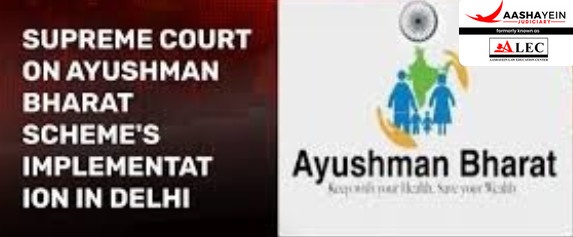In a significant legal development, the Supreme Court has temporarily stayed a Delhi High Court order directing the Delhi government to sign a Memorandum of Understanding (MoU) for implementing the Ayushman Bharat Health Infrastructure Mission (PM-ABHIM) in the national capital. The case highlights a contentious debate between the central government and the AAP-led Delhi government over the best approach to healthcare for the city’s residents.
Background: The Ayushman Bharat Scheme
Launched in 2018, the Ayushman Bharat Pradhan Mantri Jan Arogya Yojana (PMJAY) is a flagship health scheme aimed at providing financial protection for hospital care to economically weaker families across India. Under the scheme, each family receives health insurance coverage of ₹5 lakh annually, ensuring access to quality secondary and tertiary healthcare services.
However, the scheme has not been implemented in Delhi due to opposition from the state government, which claims its existing healthcare initiatives better serve the population's needs.
You can also read the latest judgment by visiting [Latest Judgment].
For more information, visit [Aashayein Enquiry Section]
Delhi High Court’s Order
In December 2024, the Delhi High Court ordered the Delhi government to sign an MoU with the Centre by January 5, 2025, to roll out the PM-ABHIM scheme in the city. The Court’s directive aimed to extend the benefits of the central scheme to Delhi residents.
Supreme Court’s Interim Stay
The Supreme Court’s intervention has put the High Court order on hold. The apex court has also issued notices to the Centre, AIIMS, and the Municipal Corporation of Delhi (MCD), seeking their responses to the Delhi government’s petition challenging the High Court ruling.
This pause provides temporary relief to the Delhi government, allowing it to continue its existing healthcare initiatives without being compelled to adopt the Ayushman Bharat scheme for now.
Delhi Government’s Stand
The state’s healthcare schemes, such as DAK, offer uncapped medical expense coverage, far surpassing the benefits of PMJAY.
Delhi’s healthcare system is already well-established, with a focus on inclusivity and quality.
Replacing state schemes with Ayushman Bharat would exclude a large section of the population from critical healthcare services.
Implications for Delhi Residents
The debate over Ayushman Bharat implementation underscores the larger issue of state versus central control in healthcare policy. While the central scheme provides significant financial assistance, its limitations in coverage and scope make it less appealing to states like Delhi, which already have robust healthcare infrastructures. For Delhi residents, the current stay ensures continued access to the benefits of state-run schemes. However, the final verdict will determine whether these schemes coexist with or are replaced by Ayushman Bharat.
Conclusion
The Supreme Court’s stay on the Delhi High Court’s order has brought temporary respite to the AAP government, allowing it to continue its healthcare initiatives. However, the larger issue of balancing state-specific needs with central mandates remains unresolved.
This case is a reminder of the need for collaborative dialogue between state and central governments to ensure healthcare policies prioritize inclusivity, quality, and sustainability. As the legal proceedings unfold, the future of healthcare in Delhi hangs in the balance, highlighting the critical importance of tailored solutions for India’s diverse population.

